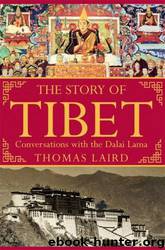The Story of Tibet: Conversations With the Dalai Lama by Thomas Laird

Author:Thomas Laird
Language: eng
Format: azw3
ISBN: 9780802143273
Publisher: Grove Press
Published: 2007-10-10T00:00:00+00:00
I came back to the Dalai Lama armed with my research. As I briefly narrated, with a sense of indignation and outrage, the game Russia and Britain had played, the Dalai Lama responded with bursts of loud laughter. He had already known the rough outline of the story before he sent me out to discover it for myself.
“Yes, there was a great deal of duplicity!” he laughed, probably shaking his head at how little attention Westerners paid to any history except their own.
“In order to check Russian influence,” the Dalai Lama continued, “I think the British wanted some kind of Manchu influence. I think the British deliberately remained vague in the treaties because that served their interest. They simply tried to keep out the Russian influence or control from Tibet. They were just using the name of Manchu suzerainty over Tibet as something useful for them. At the same time, if the Manchu were to come to Tibet, they would not be interested in the British being there, or interested in British concerns in India. So it was better to keep a vague status quo. No real Manchu control, no Russian influence, no British India control.”
The British were as surprised as Lhasa was when the Manchus responded to Britain’s invasion of Tibet by invading the country themselves. The Thirteenth Dalai Lama watched these events unfold from exile. By 1908 he’d left Mongolia, stopped at Bodhisaltva Manjushri’s sacred Mt. Wutaishan and then traveled to Beijing as a last resort. The Russians would not help. He had been “deposed” by the Manchus. But because of the Manchu actions in eastern Tibet and stories of increased Manchu presence in Lhasa, going home wasn’t an option. The Thirteenth Dalai Lama went to Beijing in a desperate attempt to establish some accord with the Manchus so he could return safely to Tibet. William Woodville Rockhill, the American consul to the Manchu Empire and the first American the Dalai Lama ever met, pointed out that the monk had received many pressing invitations from the Manchu emperor to visit Beijing but that he refused them, insisting he would go to Beijing in his own time.
In September 1908, the Thirteenth finally arrived in the capital, putting the same priest-patron interpretation on the relationship that the Fourteenth Dalai Lama uses today. “I went,” the Thirteenth wrote, “because the Great Fifth Dalai Lama and the Manchu Emperor had made an agreement to help each other in the way that a priest and layman help each other.” The Manchus were eager to install the Dalai Lama as a figurehead, in Lhasa, to give legitimacy to their rule. Western journalists in Beijing reported that the Manchus had stripped the Thirteenth of temporal authority, and no one thought he could recover it.
In Beijing, his greeting from the Manchu differed dramatically from that given to the Fifth Dalai Lama in 1653. The empress dowager Cixi demanded that the Dalai Lama kowtow before her puppet emperor Guangxu, whereas the Fifth had been received as an equal.
Download
This site does not store any files on its server. We only index and link to content provided by other sites. Please contact the content providers to delete copyright contents if any and email us, we'll remove relevant links or contents immediately.
| Buddhism | Christianity |
| Ethnic & Tribal | General |
| Hinduism | Islam |
| Judaism | New Age, Mythology & Occult |
| Religion, Politics & State |
Cecilia; Or, Memoirs of an Heiress — Volume 1 by Fanny Burney(31322)
Cecilia; Or, Memoirs of an Heiress — Volume 3 by Fanny Burney(30928)
Cecilia; Or, Memoirs of an Heiress — Volume 2 by Fanny Burney(30885)
The Secret History by Donna Tartt(16608)
Sapiens: A Brief History of Humankind by Yuval Noah Harari(13037)
Leonardo da Vinci by Walter Isaacson(11895)
The Radium Girls by Kate Moore(10901)
Sapiens by Yuval Noah Harari(4528)
The Wind in My Hair by Masih Alinejad(4420)
How Democracies Die by Steven Levitsky & Daniel Ziblatt(4392)
Homo Deus: A Brief History of Tomorrow by Yuval Noah Harari(4272)
Endurance: Shackleton's Incredible Voyage by Alfred Lansing(3834)
The Silk Roads by Peter Frankopan(3751)
Man's Search for Meaning by Viktor Frankl(3621)
Millionaire: The Philanderer, Gambler, and Duelist Who Invented Modern Finance by Janet Gleeson(3565)
The Rape of Nanking by Iris Chang(3507)
Hitler in Los Angeles by Steven J. Ross(3431)
The Motorcycle Diaries by Ernesto Che Guevara(3325)
Joan of Arc by Mary Gordon(3253)
